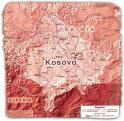Kosovo Rising
“If there is ever another war in Europe, it will come out of some damned silly thing in the Balkans” – Otto von Bismarck
“I think what we did in Kosovo was profoundly important.” – Bill Clinton
A new nation declared itself today after close to a decade as a UN protectorate; a fragment of a fragment of an extinguished arti ficial state once built upon the polyglot ruins of European empires and Muslim sultanates. This particular geographic node, Kosovo, has a quality that all of it’s larger forerunners lacked – the cultural unity of identity that will make the nation the primary loyalty of the overwhelming majority of it’s citizens. A fact on the ground that trumps diplomatic protests over the finer points of international law or the mythic appeal of seven hundred year old Lost Causes.
ficial state once built upon the polyglot ruins of European empires and Muslim sultanates. This particular geographic node, Kosovo, has a quality that all of it’s larger forerunners lacked – the cultural unity of identity that will make the nation the primary loyalty of the overwhelming majority of it’s citizens. A fact on the ground that trumps diplomatic protests over the finer points of international law or the mythic appeal of seven hundred year old Lost Causes.
Kosovo’s declaration of independence is ultimately rooted in an overwhelming demographic reality that could have only been altered by Kosovar Serbians having had larger families three and four decades ago than their poorer Albanian neighbors; and the Yugoslavian and Serbian governments having given rural Serbs some kind of economic incentive not to migrate to Belgrade or the larger towns of Serbia proper. As such, Kosovo’s declaration is worrisome to all multiethnic states plagued by separatism where the majority population is in decline – from the windows of the Kremlin, Serbia today must look hauntingly like Russia writ small.
However demographics alone was probably not enough here to explain Kosovo – Kurds, Shan, Tamils, Basques, Tibetans, Palestinians, Uighurs, Baluchis, Pushtuns and in previous centuries, the Irish – all thoroughly dominate their respective homelands but are not yet being welcomed into independence by great powers. What hapened is that the adversaries of the Kosovar Albanian, the Serbians nationalists, also morally de-legitimized themselves under Slobodan Milosevic, with years of atrocities and ethnic cleansing in Croatia and Bosnia-Herzegovina. Milosevic and his murderous policies had considerable popular support until the very end; they still retain support from a not inconsiderable, defiant, hardcore as evidenced by the inability or unwillingness of Serbia to bring Radovan Karadzic and Ratko Mladic to justice. As the Germans bade farewell forever to East Prussia and Silesia in 1945, Serbians today can reflect on Sarajevo’s impact upon their legal claim to sovereignty over Kosovo.
That being said, events can be handled well or poorly. Kosovar independence would have gone down better in a world where Russia was a prosperous, democratic state, thoroughly integrated into the Core and a regional strategic partner of the United States instead of a bitter, increasingly paranoid, plebiscitary “soft” dictatorship that views America with grave suspicion and the EU with contempt. That was not an outcome that Washington could have created alone but a relationship that three administrations might have attempted to build with Russia but elected not to do so. Benign neglect mixed with pressure toward Moscow was a deliberate choice on our part, one that might have made Berlin, London and Paris happy in the 1990’s but it wasn’t to our long term strategic benefit.
Independence is good for the Kosovars and in the last analysis, inevitable; but our statesmen should be arranging matters so that the United States profits from inevitable events rather than simply bearing the diplomatic costs.
Kosovo Links:
Page 1 of 2 | Next page